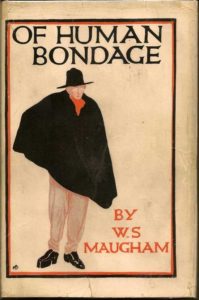Of Human Bondage (1915): A Life Without Blueprints

Of Human Bondage is one of the most influential books I’ve ever read. I discovered this book after falling down a YouTube rabbit hole. Knowing it was semi-autobiographical made it more enjoyable to read.
Around this time, I was doing research into Black conservativism and saw a video of Larry Elder discussing it on Prager “University’s” The Book Club.
I was convinced by the articulate way Larry Elder and Michael Knowles described their experience reading this book that every man should do the same.
Not only should every man read this, but he should re-read this book every decade.
Of Human Bondage gives perspective to:
- Where one is in life and where they are going
- Where their happiness and values lie
- How he came to acquire values in hindsight
- Whether those values die off or should become core values
Of Human Bondage: Life Lessons
Being in my early thirties the first time I read this book, I feel I’ve taken a myriad of lessons and gems. But the three primary lessons I learned were:
- “There is no correct blueprint to life”
- “Nothing in life is guaranteed”
- “The meaning of life is what you attribute to it”
Life isn’t linear. There is no paved path waiting for us to grace it with our footsteps, as long as you are one of us mere mortals that do not benefit from intergenerational wealth.
Life is series of peaks and valleys. We get hurt and we hurt others in a pursuit of some result.
Of Human Bondage: Main Protagonist
We walk with the main protagonist Phillip, from an early age. Both of his parents already deceased. The specifics of his father’s death aren’t revealed. But we are told his mother died from a postpartum hemorrhage during Phillip’s birth.
Phillip is raised by his Aunt and Uncle. In addition to being orphaned shortly after birth, he was born with a deformed foot. Forever being reminded of the handicap of his existence.
It would seem as if Philip would be in position where people might cater to him. But nothing could be further from the truth.
He was bullied and dismissed by other children and, at times, his uncle. Unfortunately, Phillip would have trouble finding his tribe.
For a good portion of the book, we see Phillip being lost but trying to find a purpose and support system.

For more insights into therapeutic themes in movies and TV, check out my podcast, Watch This with Eli here on my website or wherever you find your favorite podcasts!
Phillip Wanders
Due to his aunt and uncle’s religious upbringing Phillip was, at first, interested in the priesthood.
As he gets older, he decides that he wants to travel and explore. He then finds himself in London working as an employee in an accounting firm. He quickly regrets this employment.
Later, he finds himself infatuated with the art world. He picks up again and goes to art school in Paris.
While there, we see some successful socializations as he makes friends and enemies. One friend named, Fanny Price, showed some romantic interests (with some reaction formation) in which Phillip did not reciprocate. Fanny was an upper class man at the art school, she would sometimes act as a mentor to him.
In one of the pivotal moments of the book, Fanny commits suicide. She didn’t have enough money to support her education or even to survive.
Phillip starts to analyze whether he should continue his art education. He asked well-known artist, Clutton, for his opinion. Clutton responds by telling Phillip his work is mediocre; that he shouldn’t waste his time while not make a great living.
On to Medical School
Phillip considers going to medical school like his father.
But, even in medical school, he struggled with being bullied. But not in the traditional sense. He was treated like a specimen, which bred a familiar embarrassment.
During medical school, Phillip lost money in the stock market. He was unable to pay for his education.
Like Fanny, he was haunted with suicidal ideation but never attempted. He persevered, sought and found work and shelter.
After the passing of his uncle, he was given an inheritance large enough to complete his medical school training.
Phillip’s ongoing experiences have shown that life has crossroads, plateaus, and setbacks. Furthermore, these lessons have instilled that with perseverance and hope most goals are still attainable.
Phillip also learns on this journey that nothing is promised. We will lose people that we’ve befriended and even loved. Specifically, I’m referring to Mildred.
When Phillip Met Mildred
Phillip was infatuated with Mildred the moment he laid eyes on her in a restaurant he frequented. She was a waitress who caught the eye of many of the restaurant’s patrons. These men practically kissed the ground she walked on.
Phillip, with his low self-esteem, was determined to convince her he would be the only one to love her unconditionally. He did convince Mildred and the reader of his unconditional love, but that was not enough to be rewarded with her heart.
I found myself becoming increasingly frustrated with both, at times. She would alternate between shallow interest in Phillip, then put on a façade of commitment. Mildred kept Philip a slave to her whims and wiles. Regardless of the effort and loyalty Philip showed Mildred, she would always disappoint and hurt him.
Phillip’s naivety would slowly wither. Then, unexpectedly, he would allow himself to be released from her bondage.
The theme with Mildred was repeated. But it shows, even if you are persistent and loyal, the desired result is never guaranteed.
No matter how many times Philip took her back, his love was unrequited. Even when she claimed that the love was reciprocated, it was claimed out of convenience and safety.
During their last interaction Phillip gives Mildred some medical advice about a rash. He then follows her down the street and it’s revealed that she has been prostituting herself.
Philip never speaks to her again.
The Answer to the Ultimate Question of Life, the Universe, and Everything
Throughout Phillip’s journey he often reflects on the meaning of life.
He ruminates on a conversation with a friend named Cronshaw. Cronshaw tells Philip that the meaning of life is on a Persian carpet.
Cronshaw was showing Phillip a Persian rug at that moment and Cronshaw’s meaning eluded Phillip.
However, maybe Cronshaw was onto something. Perhaps he was telling Philip that everyone must make up their own meaning in life. Claim their own place in the world.
Whether they are a financially struggling artist, a prostitute, a physician, or to leave a legacy; a mark on the world, like the figure on the carpet. That is something to live for.
Of Human Bondage: My Conclusion
Beyond the three lessons above, Of Human Bondage asks the reader, “What has you in bondage?”
- Are you in bondage of loved ones? People that don’t reciprocate the love you give, like Mildred.
- Are you in bondage of your emotions, thoughts, behaviors?
- How can we break free of the bondage that we have placed ourselves in?
- Is the life we live in our culture and society a form of expectations that we are in bondage of?
Amazon Link to Of Human Bondage

Are you or a loved one struggling with addiction, intrusive thoughts, or inappropriate sexual behavior? Schedule an appointment with Eli through Sexual Addiction Treatment Services.

